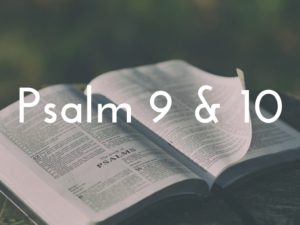Day 5 | Claire Backus
As I was doing a little research on these psalms, I discovered that in Hebrew the texts are read together to form something called an acrostic poem. An acrostic poem is a type of poetry where the first, last or other letters in a line spell out a particular word or phrase. Unfortunately, I don’t read Hebrew, so I’m not sure what it says. They also repeat Selah a few times in this psalm. The word Selah is mentioned 71 times in psalms. The authors use it as an exclamation, usually after a verse. It is believed that David wrote this poem after a victory over the Philistines.
Psalm 9 speaks more toward a lifting up of the good the Lord does when he is present and moving in people’s lives. It describes how He saves us from our enemies. It is a heartfelt thanksgiving for the good He has done.
Verses 1-2 say, “ I will give thanks to the Lord with my whole heart; I will recount all of your wonderful deeds. I will be glad and exult in you; I will sing praise to your name, O Most High.”
Psalm 10 seems as though it is a lamenting at God. He is not present in the lives of the people as the corrupt leaders persecute the innocent of Israel. It is David’s plea that God intercede to help those who are helpless. But at the end of this psalm there is a reminder that God is present.
Verses 17-18 say, “O Lord, you hear the desire of the afflicted; you will strengthen their heart; you will incline your ear to do justice to the fatherless and the oppressed, so that man who is of the earth may strike terror no more.”


Leave a Reply